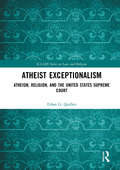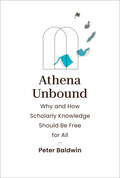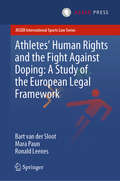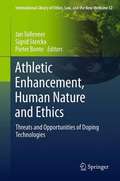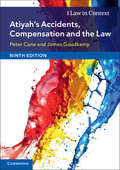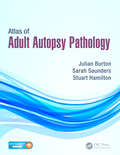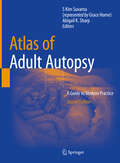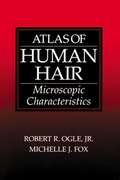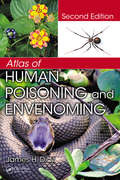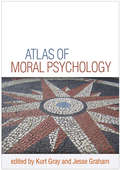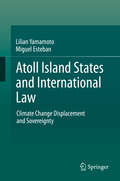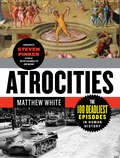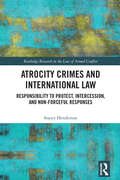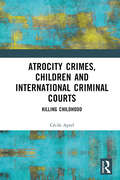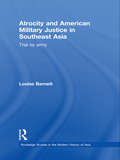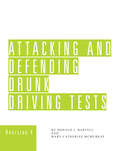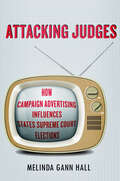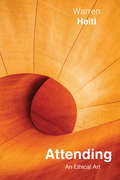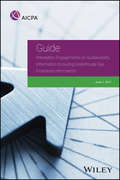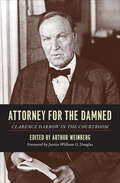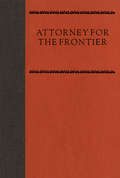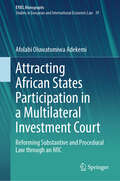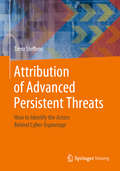- Table View
- List View
Atheist Exceptionalism: Atheism, Religion, and the United States Supreme Court (ICLARS Series on Law and Religion)
by Ethan G. QuillenDue to its Constitution, and particularly to that Constitution’s First Amendment, the relationship between religion and politics in the United States is rather unusual. This is especially the case concerning the manner with which religious terminology is defined via the discourse adopted by the United States Supreme Court, and the larger American judicial system. Focusing on the religious term of Atheism, this book presents both the discourse itself, in the form of case decisions, as well as an analysis of that discourse. The work thus provides an essential introduction and discussion of both Atheism as a concept and the influence that judicial decisions have on the way we perceive the meaning of religious terminology in a national context. As a singular source on the Supreme, Circuit, and District Court cases concerning Atheism and its judicial definition, the book offers convenient access to this discourse for researchers and students. The discursive analysis further provides an original theoretical insight into how the term ‘Atheism’ has been judicially defined. As such, it will be a valuable resource for scholars of religion and law, as well as those interested in the definition and study of Atheism.
Athena Unbound: Why and How Scholarly Knowledge Should Be Free for All
by Peter BaldwinA clear-eyed examination of the open access movement: past history, current conflicts, and future possibilities.Open access (OA) could one day put the sum of human knowledge at our fingertips. But the goal of allowing everyone to read everything faces fierce resistance. In Athena Unbound, Peter Baldwin offers an up-to-date look at the ideals and history behind OA, and unpacks the controversies that arise when the dream of limitless information slams into entrenched interests in favor of the status quo. In addition to providing a clear analysis of the debates, Baldwin focuses on thorny issues such as copyright and ways to pay for &“free&” knowledge. He also provides a roadmap that would make OA economically viable and, as a result, advance one of humanity&’s age-old ambitions.Baldwin addresses the arguments in terms of disseminating scientific research, the history of intellectual property and copyright, and the development of the university and research establishment. As he notes, the hard sciences have already created a funding model that increasingly provides open access, but at the cost of crowding out the humanities. Baldwin proposes a new system that would shift costs from consumers to producers and free scholarly knowledge from the paywalls and institutional barriers that keep it from much of the world.Rich in detail and free of jargon, Athena Unbound is an essential primer on the state of the global open access movement.
Athletes’ Human Rights and the Fight Against Doping: A Study of the European Legal Framework (ASSER International Sports Law Series)
by Ronald Leenes Bart van der Sloot Mara PaunThis book addresses the tension between, on the one hand, anti-doping practices and measures and, on the other hand, the fundamental rights of athletes. New techniques for testing and re-testing samples taken several years ago, have caused a push by the World Anti-Doping Agency and affiliated organizations for stricter rules, more doping tests and higher sanctions. Meanwhile, many States are adopting new laws and regulations to facilitate this push. At the same time, privacy and data protection have gained new momentum, especially in the European Union, where the General Data Protection Regulation came into effect in May 2018. It contains new obligations for data controllers and processors, rights for data subjects and sanctions for those violating the data protection rules. It is clear that gathering whereabouts information on athletes, collecting urine and blood samples, analyzing the samples and using the data distilled there from falls within the scope of the data protection framework. In addition, European athletes can invoke their rights to privacy, fair trial and freedom from discrimination as guaranteed by the European Convention on Human Rights. The book is aimed at professionals and organizations involved in sports and anti-doping and provides them with an opportunity to delve into and understand the rights guaranteed to athletes within the European context. Furthermore, it is equally relevant for privacy and data protection lawyers and human rights scholars wishing to familiarize themselves with the difficult questions relating to human rights protection in the world of sport and anti-doping. Written in accessible language, it should also prove useful to athletes and laymen wanting to learn about the rules applicable to almost everyone who practices sport, even at a local amateur level. Bart van der Sloot is senior researcher at Tilburg University, Tilburg, The Netherlands, Mara Paun is PhD researcher at Tilburg University, Tilburg, The Netherlands, Ronald Leenes is professor at Tilburg University, Tilburg, The Netherlands.
AthleticEnhancement, Human Nature and Ethics: Threats and Opportunities of Doping Technologies (International Library of Ethics, Law, and the New Medicine #52)
by Sigrid Sterckx Pieter Bonte Jan TolleneerThe book provides an in-depth discussion on the human nature concept from different perspectives and from different disciplines, analyzing its use in the doping debate and researching its normative overtones. The relation between natural talent and enhanced abilities is scrutinized within a proper conceptual and theoretical framework: is doping to be seen as a factor of the athlete's dehumanization or is it a tool to fulfill his/her aspirations to go faster, higher and stronger? Which characteristics make sports such a peculiar subject of ethical discussion and what are the, both intrinsic and extrinsic, moral dangers and opportunities involved in athletic enhancement? This volume combines fundamental philosophical anthropological reflection with applied ethics and socio-cultural and empirical approaches. Furthermore guidelines will be presented to decision- and policy-makers on local, national and international levels. Zooming in on the intrinsic issue of what is valuable about our homo sapiens biological condition, this volume devotes only scant attention to the specific issue of natural talent and why such talent is appreciated so differently than biotechnological origins of ability. In addition, specific aspects of sports such as its competitive nature and its direct display of bodily prowess provide good reason to single out the issue of natural athletic talent for sustained ethical scrutiny.
Atiyah's Accidents, Compensation and the Law
by Peter CaneSince publication of the seventh edition of this seminal text, personal injury law has witnessed momentous changes. A major overhaul of the social security system began in 2012 and the Equality Act 2010 significantly modifies anti-discrimination law and its impact on the disabled. But perhaps the most important legal developments have affected the financing and conduct of personal injury claiming and the operation of the claims-management industry. This new edition takes account of all this activity while setting it into a wider and longer perspective. Complaints that Britain is a 'compensation culture' and that the tort system is out of control are explained and assessed and options for further change are explored. Through the turmoil and controversy, the tort system remains a central feature of the legal and social landscape. The book's enduring central argument for its radical reform remains as compelling as ever.
Atiyah's Accidents, Compensation and the Law (Law in Context)
by Peter Cane James GoudkampNow in its ninth edition, Atiyah's Accidents, Compensation and the Law explores the recent and continuous developments in personal injury law by applying social context to the relevant legal principles. Those principles remain in need of radical reform. Updates to the text include discussion of the major changes to the way compensation is calculated and claimed, evolving funding arrangements for personal injury litigation, and dramatic shifts in the claims management industry. Suitable for both undergraduate and postgraduate students taking courses in tort law, this new edition balances theory, practice and context. It draws on new legislation, research and case law to offer the reader thought-provoking examples and analysis.
Atlas of Adult Autopsy Pathology
by Stuart Hamilton Julian Burton Sarah SaundersThe Atlas of Adult Autopsy Pathology is a full-color atlas for those performing, or learning to perform, adult autopsies. It is arranged by organ systems and also includes chapters on external examination findings, the effect of decomposition, and histopathological findings, as well as procedures and devices one may encounter during autopsy.The boo
Atlas of Adult Autopsy: A Guide to Modern Practice
by S. Kim Suvarna Abigail K. SharpThis new second edition of the successful 2016 Atlas of Adult Autopsy Practice is fully updated and refreshed with novel illustrations, and data refinements. It leads with pictures, focused text, and commentary on the autopsy itself as a specialist pathology subject. The content expands the coverage of specialist techniques with chapters covering post-mortem imaging, toxicology, neuropathology and forensic pathology from practising specialists. The addition of an original chapter addressing post-mortem histology adeptly contributes to the autopsy training literature. The book – a mainstay for the numerous practitioners working in this field, provides a standard for autopsy practice in the UK, Europe and beyond.
Atlas of Human Hair: Microscopic Characteristics
by Robert R. Ogle Jr. Michelle J. FoxIt fills a void in the resources available to researchers and practitioners in forensic hair examination by providing photographic archetypes for the microscopic characteristics of human hair and the variates of the characteristics seen in forensic examinations, including curl; color; pigment distribution and density; cortical fusi; and ovoid bodie
Atlas of Human Poisoning and Envenoming
by James H. DiazClinicians undergoing competency testing, certification, and periodic recertification are frequently faced with computer-based exams designed to evaluate clinical acumen and judgment. Test questions often include an image or radiograph followed by a vignette of the clinical encounter and a series of questions. Designed to better prepare practitione
Atlas of Moral Psychology
by Kurt Gray Jesse GrahamThis comprehensive and cutting-edge volume maps out the terrain of moral psychology, a dynamic and evolving area of research. In 57 concise chapters, leading authorities and up-and-coming scholars explore fundamental issues and current controversies. The volume systematically reviews the empirical evidence base and presents influential theories of moral judgment and behavior. It is organized around the key questions that must be addressed for a complete understanding of the moral mind.
Atoll Island States and International Law: Climate Change Displacement and Sovereignty
by Lilian Yamamoto Miguel EstebanAtoll Island States exist on top of what is perceived to be one of the planet's most vulnerable ecosystems: atolls. It has been predicted that an increase in the pace of sea level rise brought about by increasing greenhouse gas concentrations in the atmosphere will cause them to disappear, forcing their inhabitants to migrate. The present book represents a multidisciplinary legal and engineering perspective on this problem, challenging some common misconceptions regarding atolls and their vulnerability to sea-level rise. Coral islands have survived past changes in sea levels, and it is the survival of coral reefs what will be crucial for their continued existence. These islands are important for their inhabitants as they represent not only their ancestral agricultural lands and heritage, but also a source of revenue through the exploitation of the maritime areas associated with them. However, even if faced with extreme climate change, it could theoretically be possible for the richer Atoll Island States to engineer ways to prevent their main islands from disappearing, though sadly not all will have the required financial resources to do so. As islands become progressively uninhabitable their residents will be forced to settle in foreign lands, and could become stateless if the Atoll Island State ceases to be recognized as a sovereign country. However, rather than tackling this problem by entering into lengthy negotiations over new treaties, more practical solutions, encompassing bilateral negotiations or the possibility of acquiring small new territories, should be explored. This would make it possible for Atoll Island States in the future to keep some sort of international sovereign personality, which could benefit the descendents of its present day inhabitants.
Atrocities: The 100 Deadliest Episodes in Human History
by Matthew WhiteEvangelists of human progress meet their opposite in Matthew White's epic examination of history's one hundred most violent events, or, in White's piquant phrasing, "the numbers that people want to argue about. " Reaching back to the Second Persian War in 480 BCE and moving chronologically through history, White surrounds hard facts (time and place) and succinct takeaways (who usually gets the blame?) with lively military, social, and political histories.
Atrocity Crimes and International Law: Responsibility to Protect, Intercession, and Non-Forceful Responses (Routledge Research in the Law of Armed Conflict)
by Stacey HendersonDespite repeated declarations of ‘never again’ in response to the commission of atrocities, civilians have continued to be targeted by their leaders and opposition groups. The international law principles of sovereignty and non-intervention, when taken at their highest, require States to stand idle and not intervene in another State regardless of what atrocities may be occurring there. This traditional legal view is being challenged by an emerging practice of States choosing to respond in non-forceful ways, inspired by the concept of the Responsibility to Protect (R2P). Drawing on R2P, this book introduces and develops an original conceptual tool –intercession –to capture and explain this change in State practice and the impact of R2P on the development of international law. Through a close examination of State practice, the work explores whether there has been an expansion in the permissible measures and situations in which States can intervene, without using force, in response to atrocity crimes occurring in other States. This book concludes that the development of the secondary duty on the international community under R2P provides the greatest opportunity to progress the R2P framework in a meaningful way, which will have a significant impact on the protection of populations from atrocity crimes. The book will be essential reading for students, researchers and policymakers working in the areas of international law, international relations, humanitarian law, and peace and security studies.
Atrocity Crimes, Children and International Criminal Courts: Killing Childhood
by Cécile AptelThis book shows how international criminal courts have paid only limited and inconsistent attention to atrocity crimes affecting children. It elucidates the many structural, legal, financial and even attitudinal obstacles, often overlapping, that have contributed to the international courts’ focus on the experience of adults, rendering children almost invisible. It reviews whether and how different international and hybrid criminal jurisdictions have considered international crimes committed against or by children. The book also considers how international criminal justice can help contribute to the recognition of the specific impact that international crimes have on children, whether as victims or as participants, and strengthen their protection. Finally, it proposes an agenda to improve this situation, making specific recommendations encompassing the urgent need to further elaborate child-friendly procedures. It also calls for international investigative and prosecutorial strategies to be less adult-centric and broaden the scope of crimes against children beyond the focus on child-soldiers. This book is an invaluable resource for academics, researchers and fieldworkers in the areas of international criminal law, international human rights law/child rights, international humanitarian law, child protection and transitional justice.
Atrocity and American Military Justice in Southeast Asia: Trial by Army (Routledge Studies in the Modern History of Asia)
by Louise BarnettThis book is an examination of American army legal proceedings that resulted from a series of moments when soldiers in a war zone crossed a line between performing their legitimate functions and committing crimes against civilians, or atrocities. Using individual judicial proceedings held within war-time Southeast Asia, Louise Barnett analyses how the American military legal system handled crimes against civilians and determines what these cases reveal about the way that war produces atrocity against civilians. Presenting these atrocities and subsequent trials in a way that considers both the personal and the institutional the author considers how and why atrocity happens, the terrain of justification, and the degree to which the army and American society have been willing to take military crimes against civilians seriously. Atrocity and American Military Justice in Southeast Asia will be of interest to students, scholars and professionals interested in Military Justice, Military history and Southeast Asian History more generally.
Attacking & Defending Drunk Driving Tests
by Don BartellThis start-to-finish guide to winning DUI trials provides sophisticated courtroom tactics, a concise and effective approach to voir dire, sample cross-examinations, trial-tested arguments, underlying science and law, and pattern motions with points and authorities. Question-by-question and argument-by-argument, Attacking and Defending Drunk Driving Tests explains how to soften resolute juries by picking apart unyielding police reports and bulletproof lab reports. These courtroom-proven strategies are supported with understandable science in a coordinated trial attack that will leave the prosecution wondering how its formerly solid case became so weak. Attacking and Defending Drunk Driving Tests is a complete strategy, law, science, and forms guide containing tactics and arguments found nowhere else. While it focuses on attacking drunk driving tests, it also takes you step-by-step from discovery and investigation through motion practice to trial. This start-to-finish guide to winning DUI trials provides sophisticated courtroom tactics, a concise and effective approach to voir dire, sample cross-examinations, trial-tested arguments, underlying science and law, and pattern motions with points and authorities. Question-by-question and argument-by-argument, Attacking and Defending Drunk Driving Tests explains how to soften resolute juries by picking apart unyielding police reports and bulletproof lab reports. These courtroom-proven strategies are supported with understandable science in a coordinated trial attack that will leave the prosecution wondering how its formerly solid case became so weak. Attacking and Defending Drunk Driving Tests is a complete strategy, law, science, and forms guide containing tactics and arguments found nowhere else. While it focuses on attacking drunk driving tests, it also takes you step-by-step from discovery and investigation through motion practice to trial. This start-to-finish guide to winning DUI trials provides sophisticated courtroom tactics, a concise and effective approach to voir dire, sample cross-examinations, trial-tested arguments, underlying science and law, and pattern motions with points and authorities. Question-by-question and argument-by-argument, Attacking and Defending Drunk Driving Tests explains how to soften resolute juries by picking apart unyielding police reports and bulletproof lab reports. These courtroom-proven strategies are supported with understandable science in a coordinated trial attack that will leave the prosecution wondering how its formerly solid case became so weak. Attacking and Defending Drunk Driving Tests is a complete strategy, law, science, and forms guide containing tactics and arguments found nowhere else. While it focuses on attacking drunk driving tests, it also takes you step-by-step from discovery and investigation through motion practice to trial.
Attacking Judges: How Campaign Advertising Influences State Supreme Court Elections
by Melinda Gann HallNasty, below-the-belt campaigns, mudslinging, and character attacks. These tactics have become part and parcel of today's election politics in America, and judicial elections are no exception. Attacking Judges takes a close look at the effects of televised advertising, including harsh attacks, on state supreme court elections. Author Melinda Gann Hall investigates whether these divisive elections have damaging consequences for representative democracy. To do this, Hall focuses on two key aspects of those elections: the vote shares of justices seeking reelection and the propensity of state electorates to vote. In doing so, Attacking Judges explores vital dimensions of the conventional wisdom that campaign politics has deleterious consequences for judges, voters, and state judiciaries. Countering the prevailing wisdom with empirically based conclusions, Hall uncovers surprising and important insights, including new revelations on how attack ads influence public engagement with judicial elections and their relative effectiveness in various types of state elections. Attacking Judges is a testament to the power of institutions in American politics and the value of empirical political science research in helping to inform some of the most significant debates on the public agenda. This book's results smartly contest and eradicate many of the fears judicial reformers have about the damaging effects of campaign negativity in modern state supreme court elections.
Attending: An Ethical Art (McGill-Queen's Studies in the History of Ideas #82)
by Warren HeitiAttending – patient contemplation focused on a particular being – is a central ethical activity that has not been recognized by any of the main moral systems in the European philosophical tradition. That tradition has imagined that the moral agent is primarily a problem solver and world changer when what might be needed most is a witness.Moral theory has been agonized by dualism – motivation is analyzed into beliefs and desires, descriptions of facts and dissatisfactions with them, while action is represented as an effort to lessen dissatisfaction by altering the empirical world. In Attending Warren Heiti traces an alternative genealogy of ethics, drawing from the Platonism recovered by Simone Weil and developed in the work of Iris Murdoch, John McDowell, and Jan Zwicky. According to Weil, virtue is knowledge, knowledge is embodied, and the knower is nested in an ecosystem of relationships. Instead of analyzing and solving theoretical problems, Heiti aims to clarify the terrain by setting up objects of attention from more than one discipline, including not only philosophy but also literature, psychology, film, and visual art.The traditional picture captures one important type of ethical activity: faced with a moral problem, one looks to a general rule to furnish the solution. But not all problems conform to this model. Heiti offers an alternative: to see what is needed, one attends to the particular being.
Attestation Engagements on Sustainability Information
by AicpaNew Authoritative Guide for SSAE No. 18 and Sustainability Organizations are increasingly seeking to add credibility to sustainability information: According to the CFA Institute, 73 percent of portfolio managers and research analysts surveyed take sustainability matters into account when making investment decisions and 69 percent believe it is important that such information be subject to independent assurance. This new guide will assist CPAs with interpreting and applying the clarified attestation standards (SSAE No. 18) when performing examination or review engagements on sustainability information. Note: This guide supersedes AICPA Statement of Position (SOP) 13-1, Attest Engagements on Greenhouse Gas Emissions Information. The content of that SOP has been updated for the clarified attestations standards and included in the guide.
Attorney for the Damned: Clarence Darrow in the Courtroom
by Clarence DarrowCourtroom summations by &“one of America&’s greatest lawyers . . . this book is better than an entire college course in Rhetoric&” (Thomas Geoghegan, author of The Secret Lives of Citizens and Only One Thing Can Save Us). A famous defender of the underdog, the oppressed, and the powerless, Clarence Darrow (1857–1938) is one of the true legends of the American legal system. His cases were many and various, but all were marked by his unequivocal sense of justice, as well as his penchant for representing infamous and unpopular clients, such as the Chicago thrill-killers Leopold and Loeb; Ossian Sweet, the African American doctor charged with murder after fighting off a violent, white mob in Detroit; and John T. Scopes, the teacher on trial in the famous Scopes Monkey Trial. Published for the first time in 1957, Attorney for the Damned collects Darrow&’s most influential summations and supplements them with scene-setting explanations and comprehensive notes by Arthur Weinberg. Darrow confronts issues that remain relevant over half a century after his death: First Amendment rights, capital punishment, and the separation of church and state. With an insightful forward by Justice William O. Douglas, this volume serves as a powerful reminder of Darrow&’s relevance today. &“Clarence Darrow [was] perhaps the most effective courtroom opponent of cant, bigotry, and special privilege that our country has produced . . . The ghastly comedy of his deadpan interrogation of William Jennings Bryan on the origin of man in the Scopes case is particularly recommended.&” —The New Yorker &“More illuminating as well as more dramatic than anything that has yet appeared about [Darrow].&” —Herald Tribune Book Review
Attorney for the Frontier: Enos Stutsmon
by Dale Gibson Lee Gibson Cameron HarveyThe purpose of this biography is to bring to public attention the importance of the contributions made by Enos Stutsman, an American, to the history of the province and the Northwest generally. It also attempts to impress and entertain the reader by highlighting Stutsman’s personal qualities.
Attorney-Client Privilege in the Americas
by Dirk James R. Silkenat Van GervenOne of the major challenges facing the legal profession today is how to adapt and apply the concept of attorney-client privilege (or professional secrecy) in an increasingly globalised world. Rules on attorney-client privilege differ significantly from country to country. This book explores such differences within 32 jurisdictions in North, Central and South America and the Caribbean. Together with its complementary volume Professional Secrecy of Lawyers in Europe (Cambridge, 2013), this book explores the creation of a common definition for attorney-client privilege which can be accepted by a wide variety of countries and international institutions. Practice and interpretation within each jurisdiction is mapped and explored, including reference to local laws, ethical rules and case law. This book is a useful resource for those working on transactions or litigations which involve several countries.
Attracting African States Participation in a Multilateral Investment Court: Reforming Substantive and Procedural Law through an MIC (European Yearbook of International Economic Law #39)
by Afolabi Oluwatomiwa AdekemiThis book delves into the intricacies of encouraging African states' participation in a Multilateral Investment Court (MIC), set against the backdrop of their experiences with international investment agreements and the Investor-State Dispute Settlement (ISDS) system. It tackles the pervasive issues within the existing ISDS framework, emphasising the critical standpoint of African states on the desired ISDS reform. The text unpacks the foundational standards of treatment—such as Fair and Equitable Treatment (FET), guarantees against expropriation, and the Full Protection and Security (FPS) standard—highlighting how they are commonly invoked against African nations. Through detailed analysis, the book exposes the inherent challenges these standards pose to the sovereignty and regulatory autonomy of African states, particularly in contexts that demand sustainable development and public interest considerations. The book critically evaluates the proposed MIC as a reformative alternative to traditional ISDS mechanisms, scrutinising its potential to address the substantive and procedural grievances that have historically disadvantaged African states within the global investment arbitration landscape. It proposes a nuanced framework for reform that aligns with the developmental aspirations and legal traditions of African countries. By providing in-depth insights into the procedural and substantive dimensions of international investment law from an African perspective, the work advocates for a balanced approach that respects the regulatory prerogatives of states while ensuring fair protection of foreign investments. The book stresses the importance of this balanced approach, which is crucial for attracting African states' participation in a future MIC. The target audience for this comprehensive monograph includes legal academics, practitioners, law students, and other enthusiasts of international investment law and its emerging reforms. Through its detailed examination of the challenges and opportunities within the current ISDS system, the book offers valuable perspectives for those engaged in the discourse on international investment law's evolution in response to the global backlash against traditional ISDS.
Attribution of Advanced Persistent Threats: How to Identify the Actors Behind Cyber-Espionage
by Timo SteffensAn increasing number of countries develop capabilities for cyber-espionage and sabotage. The sheer number of reported network compromises suggests that some of these countries view cyber-means as integral and well-established elements of their strategical toolbox. At the same time the relevance of such attacks for society and politics is also increasing. Digital means were used to influence the US presidential election in 2016, repeatedly led to power outages in Ukraine, and caused economic losses of hundreds of millions of dollars with a malfunctioning ransomware. In all these cases the question who was behind the attacks is not only relevant from a legal perspective, but also has a political and social dimension.Attribution is the process of tracking and identifying the actors behind these cyber-attacks. Often it is considered an art, not a science.This book systematically analyses how hackers operate, which mistakes they make, and which traces they leave behind. Using examples from real cases the author explains the analytic methods used to ascertain the origin of Advanced Persistent Threats.
